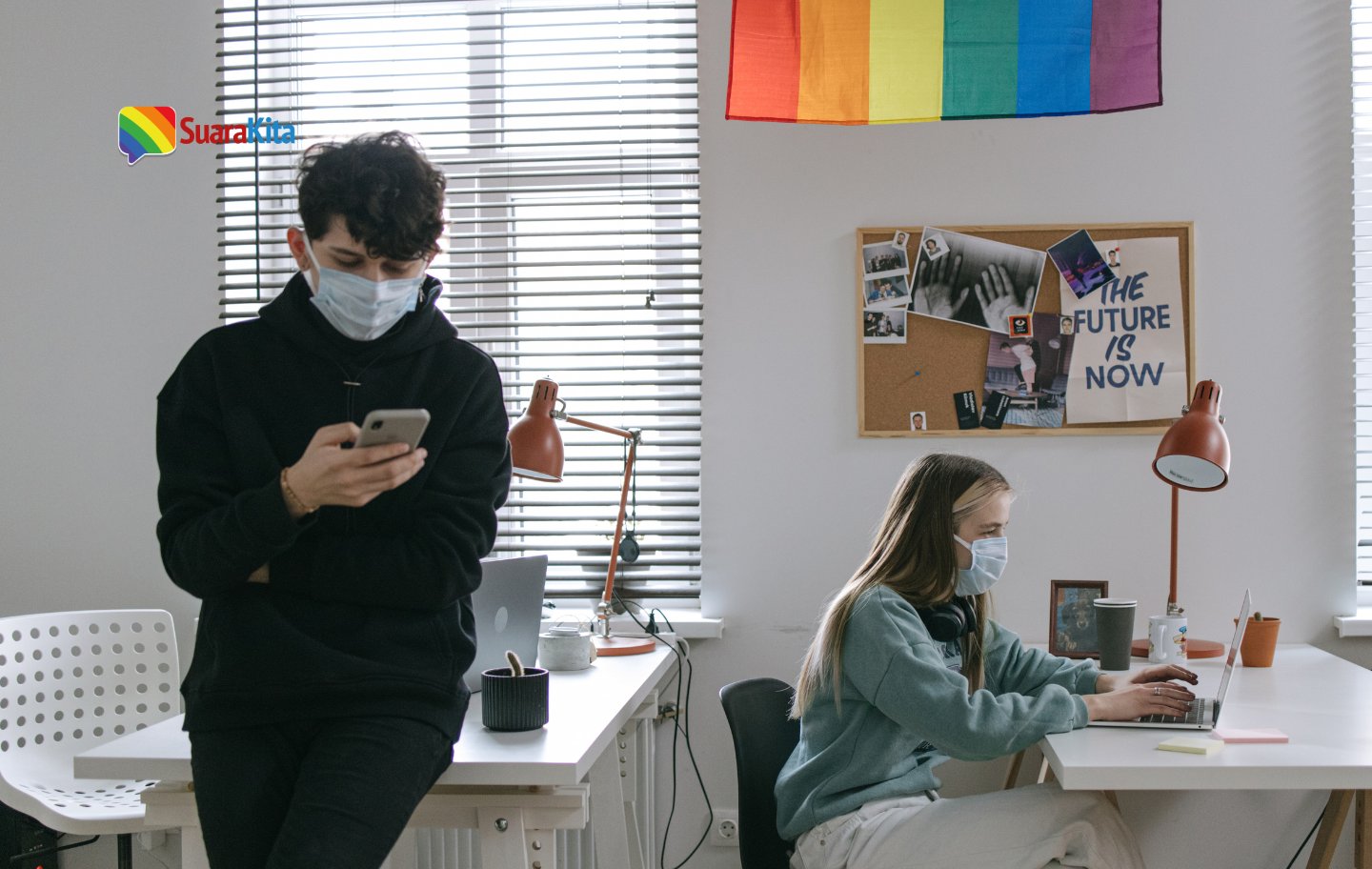Kian banyaknya pegawai LGBT di ruang publik (pemerintahan) telah mewarnai tangga politik di Amerika Latin. menurut sebuah laporan baru dari Associated Press.
Di seluruh Amerika Latin : Kolombia, Ekuador, Brasil, Argentina, dan Meksiko, semuanya memiliki minimal satu orang LGBT secara terbuka di kantor pemerintahan. Visibilitas LGBT kian diapresiasi dengan positif. Berikut ini beberapa LGBT yang berhasil merebut ruang publik tersebut.
-Tatiana Pineros , adalah seorang Transgender yang mengepalai Lembaga Kesejahteraan Sosial di Kota Bogota.
– Carina Vance adalah seorang Lesbian yang menjadi Menteri Kesehatan Ekuador
– Rep Jean Wyllys seorang gay yang menjadi Anggota parlemen nasional Brazil
– Margarita Uranga Munoz seorang gay anggota parlemen nasional Meksiko
– Osvaldo Lopez seorang gay yang menjadi Senator Argentina
Meskipun Ada beberapa LGBT yang berhasil di Jabatan yang penting namum angka kekerasan terhadap LGBT belumlah secara maksimal dapat ditekan, Prakterk kebencian berujung pembunuhan kerap terjadi, , Pada Rentang tahun 2006-2009 di Kolombia terdapat 226 kasus pembunuhan yang menimpa LGBT, dan pada tahun 2010 ada 260 korban kekerasan terhadap LGBT.
Marcela Sanchez aktifis hak-hak LGBT di Kolombia mengatakan, bahwa butuh waktu untuk memberantas kekerasan terhadap orang-orang anti LGBT, dan yang terpenting dari itu semua bahwa memberikan pendidikan tentang seksualitas dan juga menghargai perbedaan yang berbasis identitas gender sangat diperlukan sebagai strategi yang sangat bagus diterapkan di sekolah-sekolah sejak dini.
Sumber : http://www.advocate.com
A growing number of LGBT public servants have scaled political ladders in Latin America to hold high-profile offices, according to a new report from the Associated Press.
Colombia, Ecuador, Brazil, Argentina, and Mexico all have at least one openly LGBT person in national political office, and advocates say growing public acceptance and visibility has begun to change the traditionally conservative region.
“It’s all about the mobilization of groups demanding their rights,” said Marcela Sanchez, a prominent LGBT activist in Colombia. “It didn’t just spring up spontaneously.”
Read the full report — which profiles Tatiana Piñeros, Colombia’s head of social welfare; Ecuador’s health minister, Carina Vance; and Brazilian lawmaker Jean Wyllys (www.advocate.com)
——
BOGOTA, Colombia (AP) — Tatiana Pineros is a man by birth and a woman by choice.
Pineros, 34, is also a high-powered public servant who manages a $360 million budget and nearly 2,000 employees in Colombia’s biggest and most powerful municipal government.
Her appointment by Bogota’s new mayor to head the capital’s social welfare agency was remarkable for how unremarkably it was received by Colombia’s predominantly Roman Catholic public.
Across Latin America, public acceptance is gradually growing for lesbian, gay, bisexual and transgender, or LGBT, officials. It’s a phenomenon that has accompanied activists’ broader struggle to win rights to marry, adopt children or share financial benefits with same-sex partners, and to transform the way socially conservative nations view and treat gays.
“It’s all about the mobilization of groups demanding their rights,” said Colombia’s best-known gay activist, Marcela Sanchez. “It didn’t just spring up spontaneously.”
Ecuador’s new health minister, Carina Vance, can attest to the change. She has a master’s degree in public health from the University of California, Berkeley. She is also openly lesbian.
Before being named in January, Vance, 34, campaigned as an activist against clinics accused of using coercion to try to “cure” gays of their homosexuality. Her ministry is now investigating those alleged practices. She told a TV interviewer last month that “we will take action against those responsible.”
Brazil’s first openly gay national lawmaker, Rep. Jean Wyllys, was elected last year, and activists say six other openly gay people have been elected to public office in Latin America’s most populous nation.
Wyllys, who first gained fame on the Big Brother reality TV show, has so far failed to pass legislation against homophobic insults and discrimination. His nemesis in the battle has been the Congress’ evangelical Christian caucus.
Despite Wyllys’ rise, openly gay Brazilians are rare in appointed positions. The gay community was outraged last year when a heterosexual was named to head the gay rights division in the federal Human Rights Ministry. The heterosexual never took the job, which remains unfilled.
Luiz Mott, an anthropologist and founder of the Grupo Gay da Bahia, said many more homosexuals are in government posts but have kept their sexual orientation private in a kind of self-censorship.
Advances have also been made in other countries but through appointment or complicated election laws that allow legislators to win their posts without being directly elected.
Mexico, for example, has one gay national lawmaker, Congresswoman Enoe Margarita Uranga Munoz, who ended up high on the list of candidates for seats that Mexican law allots to parties by their share of the vote.
Sen. Osvaldo Lopez, the only openly gay member of Argentina’s Congress, was named in July to replace a senator who died in an auto accident.
Lopez’s country and Brazil are the only in Latin America to permit gay marriage nationwide, though Mexico City also allows it under a law promoted by Uranga before her election to Congress.
Same-sex couples also have gained rights to inherit from their partners or share insurance due to court decisions in Colombia, Brazil, Argentina and Mexico City.
Colombia’s Constitutional Court is now weighing whether to join Argentina and Mexico City in allowing same-sex couples to adopt.
But other Latin American countries have done little if anything to recognize what for LGBT activists are basic civil rights. Activists also say the successes of a few openly gay officials hasn’t stopped anti-gay violence.
On March 4, a gay 24-year-old Chilean was so brutally beaten that doctors had to induce a coma to treat him for head trauma and a broken right leg. Prosecutors say a swastika was drawn on the victim’s chest.
“The general practice on the continent is of an open season on LGBTs that never closes,” the gay rights group Colombia Diversa says in a regional report on violence against the community.
It found that 83 of 226 murders of LGBT people in Colombia from 2006 to 2009 were classified as hate crimes, with no motive listed for most.
Brazil’s Grupo Gay da Bahia, which has been keeping records of gay-bashing for more than three decades, says 260 LGBT people were murdered in Brazil in 2010, or 113 percent more than five years earlier.
Police in Lima, Peru, beat LGBT rights activists who smooched in a downtown plaza during a “Kisses Against Homophobia” demonstration in February 2011.
Proposed legislation to grant interitance rights to same-sex couples has been languishing for five years in Venezuela’s National Assembly.
“The fight is for us to no longer be treated like animals,” said Pineros, who said she has focused on building a career rather than crusading for gay rights.
Marcela Sanchez of the LBGT rights group Colombia Diversa said Pineros’ appointment helps dignify the community by helping to “erase the negative image in society that (transsexuals) are only good for prostitution.”
Pineros, born the second of three male siblings, was raised Catholic and says she suffered no discrimination at home. She just didn’t much like it when her father gave her toy automobiles.
“In my case I’d like to be recognized as the woman I always wanted to be,” said Pineros, a tall, slender brunette who is elegant in a sleeveless green dress and suede high-heeled boots as she talks with a reporter in her unadorned office overlooking Bogota.
Not until she “met a man” at age 29 and left an accounting job at the state comptroller’s office for a public relations agency position did Pineros decide to initiate the sex change.
A few surgeries and hormone pill regimens later, she had larger breasts, a slimmer nose and a new job in public administration, working for the district of Chapinero where Bogota’s gay community is centered.
As part of her appointment, she’ll oversee Bogota’s social welfare spending on everything from homes for the elderly to cafeterias for preschoolers. Mayor Gustavo Petro said via email her appointment “is a sign this mayoral administration recognizes diversity and doesn’t discriminate based on sexual orientation, ethnicity or age.”
In a sign of the times, the public reaction to Pineros’ appointment has been smooth, with no criticism in the last two months ago.
But that doesn’t mean Bogota’s LGBT community is universally embraced.
Bogota’s secretary of education, Oscar Sanchez, is under assault by conservatives for a program to help primary and secondary school teachers discourage race- and gender-based discrimination.
When Brazil’s Education Ministry designed a program last year battling anti-gay discrimination, complaints from evangelicals in Congress prompted President Dilma Rousseff to withdraw the proposed legislation.
Sequera reported from Bogota, Bajak from Lima, Peru. Also contributing were Associated Press writers Gonzalo Solano in Quito, Ecuador, Jenny Barchfield in Rio de Janeiro, Marco Sibaja in Brasilia, Brazil, Fabiola Sanchez and Jorge Rueda in Caracas, Venezuela, Almudena Calatrava in Buenos Aires, Argentina, Eva Vergara in Santiago, Chile, and Eduardo Castillo in Mexico City.
Copyright © 2012 The Associated Press. All rights reserved.



